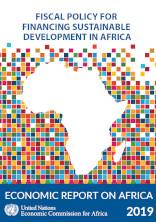Economic Report on Africa 2019

Africa is at a critical juncture in its development trajectory. Policies adopted now will determine how quickly the continent accelerates growth and creates prosperity for all. In 2015, African countries signed up to two important development agendas: the global 2030 Sustainable Development Goals (SDG), which aims to leave no one behind as countries develop, and the African Union’s Agenda 2063, which sets out a blueprint for the “Africa we want”. A decade away from the SDG endpoint, African countries continue to search for policy mixes to help accelerate the achievement of these targets. However, for many countries, financing remains the biggest bottleneck with implementing capacity a close second.
To meet the SDGs Africa will need to raise an estimated 11 per cent of GDP per year for the next 10 years to close the financing gap. Today, Africa’s average tax revenue to GDP is below 16 per cent. Efficient and effective domestic resource mobilization can address a substantial portion of this financing shortfall. The Economic Commission for Africa has consistently highlighted this position culminating in the position paper for the 2015 Addis Ababa Action Agenda on Financing for Development. The Economic Report on Africa: Fiscal Policy for Financing Sustainable Development in Africa, 2019, examines the institutional and policy reforms required to enable African countries to maximize domestic resource mobilization. The report focuses on the instrumental role of fiscal policy in crowding in investment and creating adequate fiscal space for social policy, including supporting women and youth-led small and medium enterprises.
Key messages in visuals
Launch of the Report